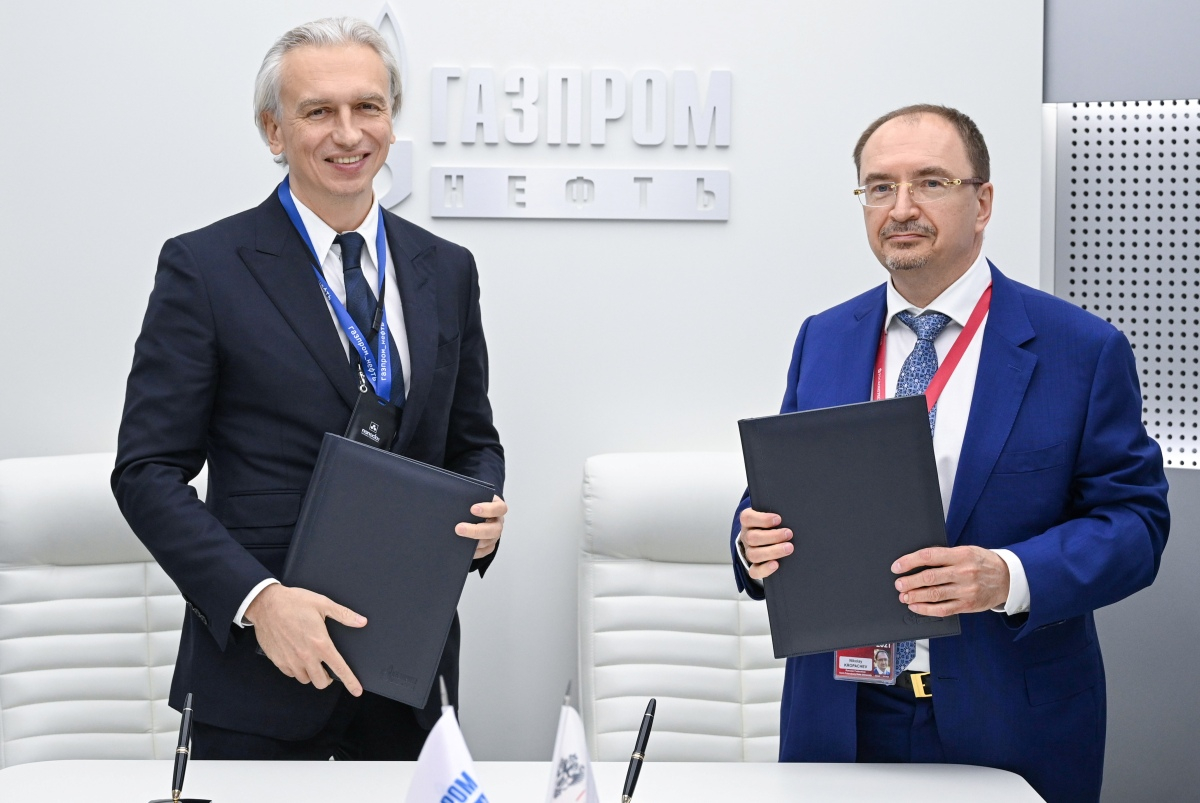Gazprom Neft and St Petersburg University plan to develop a science and technology centre at St Petersburg

On 3 June at the St Petersburg International Economic Forum, Gazprom Neft and St Petersburg University signed an engagement agreement to cooperate in the establishment of an innovative science and technology centre ‘The Neva Delta’ in St Petersburg. The document was signed by Alexander Dyukov, Gazprom Neft CEO, and Nikolay Kropachev, Rector of St Petersburg University.
Gazprom Neft is one of the key employers in St Petersburg. The science and technology cluster of the company employs more than 9,000 developers and programmers. Annually, about 200 students from St Petersburg universities do practical training and internships at Gazprom Neft. According to statistics, every fifth of them finds employment in the company after graduation.
The site for the development of the innovative science and technology centre ‘The Neva Delta’ is the development area of St Petersburg University in the Pushkinsky District of St Petersburg. On an area of about 100 hectares, the University, together with its technological partners, will place research and production facilities, a business incubator, a technopark, and core facilities. Among the priority areas of work of the residents of the University science and technology centre ‘The Neva Delta’ is the development of: fundamentally new materials and high technologies, including those that can be used in the Arctic; advanced technologies for hydrocarbon production; projects of alternative energy sources; and digital technologies.
Gazprom Neft plans to become a permanent partner of the project and integrate its facilities into the ecosystem of its science and technology cluster, which already has more than ten innovation centres. The company's engineers plan to develop laboratories for 3D printing and creation of new industrial materials at the University science and technology centre ‘The Neva Delta’. Earlier, Gazprom Neft, together with scientists, has already synthesised a super-strong material for manufacturing cutting tools for drilling equipment. This material is comparable in strength and resistance to loads with pobedit (tungsten-carbide) and is close to the properties of diamond.
The University has been collaborating with Gazprom Neft in various areas for many years. University experts are involved in preparing innovative projects for Gazprom Neft. Our students do internships at the company, and our graduates find employment in the company. I believe that this agreement will make it possible for us to take our joint efforts to a new level.
Nikolay Kropachev, Rector of St Petersburg University
The innovative science and technology centre ‘The Neva Delta’ will also be a place for testing new technologies of Gazprom Neft for their subsequent implementation at refineries and oil fields throughout Russia. Looking ahead, the company is considering the possibility of opening its own R&D centre on the territory of the science and technology centre.
Extension of cooperation between Gazprom Neft and St Petersburg University will make it possible to synchronise the company's technological development strategy with: the scientific ecosystem of St Petersburg; and programmes for training young researchers, engineers, and digital specialists. This will enable Gazprom Neft to increase its research and development activities and recruit talented personnel while they are still at university.
This year marks ten years since our company moved to the Northern capital. During this time, an ecosystem of Gazprom Neft scientific and engineering centres has been created in the city. They work in close collaboration with St Petersburg University. The technologies created as a result of this partnership have the wide-ranging scope of application: from the Arctic to the oil fields of the Middle East. I am sure that the expansion of our cooperation with the University as part of the innovative science and technology centre will contribute to our common goal – to consolidate St Petersburg’s status as the science and technology capital both of our industry and Russian industry, as a whole.
Alexander Dyukov, Gazprom Neft CEO
The project of the innovative science and technology centre ‘The Neva Delta’ was presented by St Petersburg University at the St Petersburg International Economic Forum in June 2019. Several dozen technology companies, partners of the University, have already expressed their interest in participating in the project and have applied for housing their offices on the territory of ‘The Neva Delta’. The innovative science and technology centre ‘The Neva Delta’ of St Petersburg University will house: a technopark; R&D centres; innovative laboratories; pilot production facilities; and testing and academic sites. Pursuant to federal law, innovative science and technology centres have received the right to tax exemption similar to that of Skolkovo.
St Petersburg University is one of the largest research and educational centres in Europe and the world. 25,000 students study at the University, and 5,000 academics work here. Among its alumni and staff are Nobel and Fields laureates. The University scientists are annually listed among the Web of Science (WoS) Highly Cited Researchers. The University today is an advanced research centre. It includes more than 15 large laboratories, the Institute of Translational Biomedicine, the Pirogov Clinic of High Medical Technologies, and 24 resource centres that are part of the leading Research Park in Russia. The St Petersburg University Research Park has unique technological capabilities in Russia, and in a number of areas globally.
Gazprom Neft is developing a unique science and technology cluster in St Petersburg, which works in a single ecosystem with the city's leading universities. The technologies created as a result of this partnership have the wide-ranging scope of application: from the Arctic to the oil fields of the Middle East. In particular, thanks to a project by St Petersburg developers, Gazprom Neft has been the first in the world to produce the oil found using artificial intelligence.

